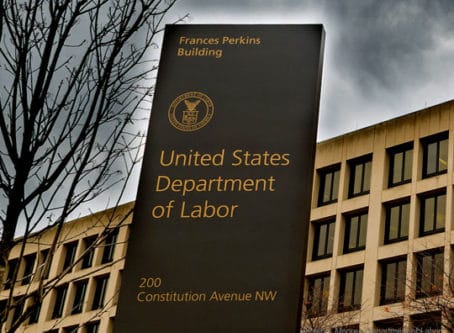
Miriam Shestack is a student at Harvard Law School.
A Department of Labor (DOL) report issued on Sunday found that the Occupational Safety and Health Administration’s (OSHA’s) enforcement activities did not sufficiently protect workers from Covid-19.
The report highlights continuing issues since the start of the Covid, especially concerning which Covid cases OSHA requires employers to report. The inspector general’s report also noted the lack of a Covid-specific rule for all industries. The report notes that OSHA should have required all employers to report all worker Covid infections regardless of whether employees were infected on the job. OSHA’s recordkeeping rule limits recording of an injury or illness to only work-related cases. As Bloomberg explains, OSHA’s requirements for employers to track and report Covid cases has been a source of friction between the agency and employers, and OSHA’s requirement have shifted over time.
Workers at Apple’s unionized retail store in Maryland are filing a complaint with the National Labor Relations Board (NLRB) after the store was excluded from some benefits.
Last month Apple announced a range of perks for retail and corporate employees in the US, including new medical benefits, prepaying for a portion of tuition for outside education, and free access to a premium Coursera subscription. However, the company withheld the benefits from the unionized store in Towson, a suburb of Baltimore, indicating that any new benefits must be negotiated as part of a collective bargaining agreement. That move sparked Wednesday’s complaint, which was filed by the International Association of Machinists and Aerospace Workers, the union representing the store. Apple’s actions mirror the approach taken by Starbucks Corp., where about 250 cafes have voted to unionize over the past year.
As Bloomberg points out, both cases highlight the murky legal terrain that employers with a mixture of union and nonunion workers face when changing benefits. Federal labor law generally prohibits companies from altering job terms without bargaining, but the NLRB may consider it unlawful discrimination to exclude union workers from new benefits extended to other employees.
A reform movement has come to the United Food and Commercial Workers International Union (UFCW), inspired by union democracy movements in the Teamsters and United Auto Workers. UFCW is one of the biggest unions in the country. Grocery workers represent more than two-thirds of the union’s total membership, with about 835,000 grocery workers—or about half of the 1.5 million grocery workers in the US—in its ranks. Jonah Furman profiled the emerging movement for Labor Notes ahead of the UFCW convention this coming April. On its website, Essential Workers for a Democratic UFCW lays out 11 resolutions designed to “transform the UFCW International into the union that essential workers need and deserve.” They are calling for direct elections of national officers and new investments in new organizing and coordinated bargaining. The latter is especially salient as a grocery mega-merger looms.
Around the world, the UN Climate Change Conference, known as COP27, will begin in Egypt on November 6. World leaders will gather at the conference to discuss climate change. A delegation from the global labour movement, including IndustriALL Global Union, aims to raise the concerns of workers at the meeting. The delegation’s priorities include: achieving meaningful just transition, demanding reparations for damage caused by climate change, and climate finance which demands that those who caused the crisis pay for it. The International Labour Orgaization (ILO) will also advocate for a Just Transition at COP27.






Daily News & Commentary
Start your day with our roundup of the latest labor developments. See all
February 27
The Ninth Circuit allows Trump to dismantle certain government unions based on national security concerns; and the DOL set to focus enforcement on firms with “outsized market power.”
February 26
Workplace AI regulations proposed in Michigan; en banc D.C. Circuit hears oral argument in CFPB case; white police officers sue Philadelphia over DEI policy.
February 25
OSHA workplace inspections significantly drop in 2025; the Court denies a petition for certiorari to review a Minnesota law banning mandatory anti-union meetings at work; and the Court declines two petitions to determine whether Air Force service members should receive backpay as a result of religious challenges to the now-revoked COVID-19 vaccine mandate.
February 24
In today’s news and commentary, the NLRB uses the Obama-era Browning-Ferris standard, a fired National Park ranger sues the Department of Interior and the National Park Service, the NLRB closes out Amazon’s labor dispute on Staten Island, and OIRA signals changes to the Biden-era independent contractor rule. The NLRB ruled that Browning-Ferris Industries jointly employed […]
February 23
In today’s news and commentary, the Trump administration proposes a rule limiting employment authorization for asylum seekers and Matt Bruenig introduces a new LLM tool analyzing employer rules under Stericycle. Law360 reports that the Trump administration proposed a rule on Friday that would change the employment authorization process for asylum seekers. Under the proposed rule, […]
February 22
A petition for certiorari in Bivens v. Zep, New York nurses end their historic six-week-strike, and Professor Block argues for just cause protections in New York City.